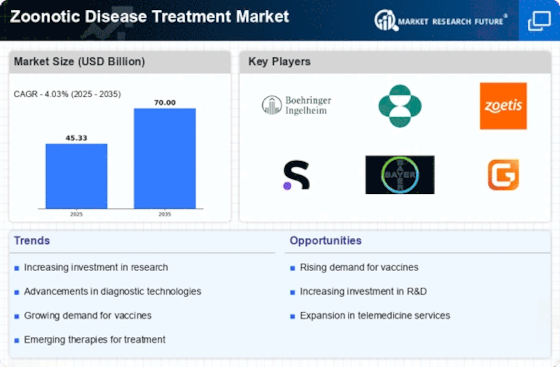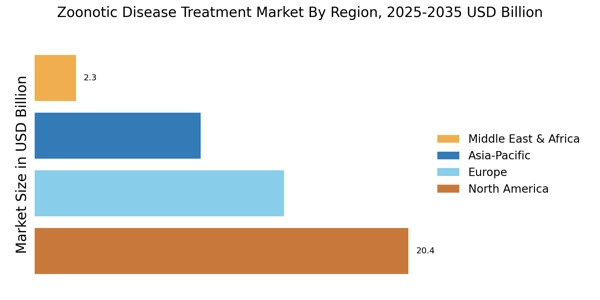Rising Incidence of Zoonotic Diseases
The increasing incidence of zoonotic diseases is a primary driver for the Zoonotic Disease Treatment Market. As urbanization and human-animal interactions escalate, the likelihood of disease transmission from animals to humans rises. Reports indicate that approximately 60% of all infectious diseases in humans are zoonotic in origin. This alarming statistic underscores the urgent need for effective treatment options. The Zoonotic Disease Treatment Market is responding to this trend by developing innovative therapies and vaccines aimed at combating these diseases. Furthermore, the economic burden associated with zoonotic diseases, which can reach billions in healthcare costs, propels investment in research and development. As awareness grows, healthcare systems are increasingly prioritizing the management and treatment of zoonotic diseases, thereby expanding the market's potential.
Growing Awareness of Zoonotic Diseases
Growing awareness of zoonotic diseases among the public and healthcare professionals is driving the Zoonotic Disease Treatment Market. Educational campaigns and media coverage have heightened understanding of the risks associated with zoonotic infections. This increased awareness is leading to greater demand for effective treatment options and preventive measures. As individuals become more informed about zoonotic diseases, they are more likely to seek medical attention and advocate for better healthcare solutions. Consequently, healthcare providers are responding by expanding their offerings in the Zoonotic Disease Treatment Market. This trend is expected to continue, as ongoing education and outreach efforts aim to further inform the public about the importance of addressing zoonotic diseases.
Advancements in Diagnostic Technologies
Advancements in diagnostic technologies are significantly influencing the Zoonotic Disease Treatment Market. Enhanced diagnostic tools enable quicker and more accurate identification of zoonotic pathogens, facilitating timely treatment interventions. Technologies such as PCR (Polymerase Chain Reaction) and next-generation sequencing are becoming integral in detecting zoonotic diseases. The market for diagnostic tools is projected to grow substantially, with estimates suggesting a compound annual growth rate of over 10% in the coming years. This growth is likely to drive the Zoonotic Disease Treatment Market as early detection leads to better treatment outcomes and reduced transmission rates. Moreover, the integration of artificial intelligence in diagnostics is expected to further streamline the identification process, thereby enhancing the overall efficiency of the healthcare response to zoonotic diseases.
Emerging Research on Novel Therapeutics
Emerging research on novel therapeutics is a significant driver of the Zoonotic Disease Treatment Market. Scientific advancements are paving the way for innovative treatment options that target zoonotic pathogens more effectively. Research institutions and pharmaceutical companies are increasingly focusing on developing new drugs and vaccines tailored to combat specific zoonotic diseases. The market is witnessing a surge in clinical trials aimed at evaluating the efficacy of these novel therapeutics. This influx of research is likely to enhance the Zoonotic Disease Treatment Market by providing healthcare professionals with a broader array of treatment options. Furthermore, the potential for personalized medicine in treating zoonotic diseases is gaining traction, suggesting a future where therapies are tailored to individual patient needs.
Increased Government Initiatives and Funding
Increased government initiatives and funding are pivotal in shaping the Zoonotic Disease Treatment Market. Governments worldwide are recognizing the critical need to address zoonotic diseases, leading to enhanced funding for research, surveillance, and treatment programs. For instance, various health organizations have allocated substantial budgets to combat zoonotic threats, reflecting a commitment to public health. This financial support is crucial for developing new treatments and improving existing ones. Additionally, collaborative efforts between governments and private sectors are fostering innovation in the Zoonotic Disease Treatment Market. Such partnerships are likely to accelerate the development of effective therapies and preventive measures, ultimately contributing to a more robust healthcare infrastructure capable of managing zoonotic diseases.

















